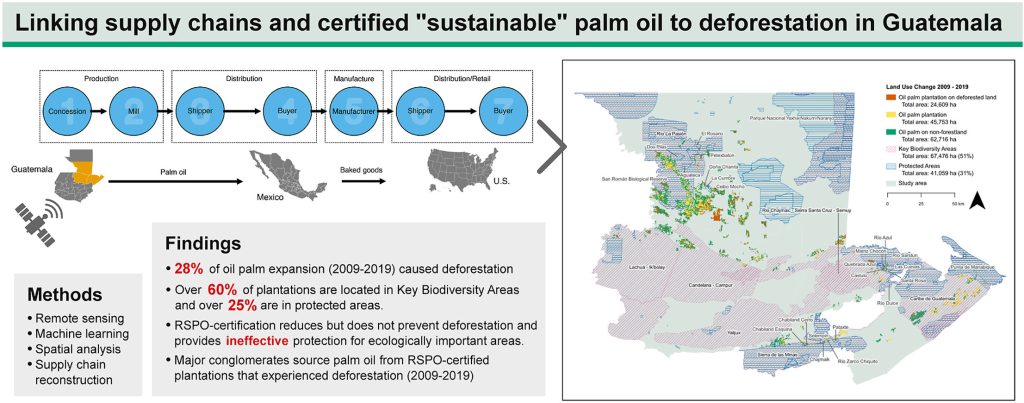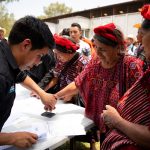Abstract
Although causal links between tropical deforestation and palm oil are well established, linking this land use change to where the palm oil is actually consumed remains a distinct challenge and research gap. Supply chains are notoriously difficult to track back to their origin (i.e., the ‘first-mile’). This poses a conundrum for corporations and governments alike as they commit to deforestation-free sourcing and turn to instruments like certification to increase supply chain transparency and sustainability. The Roundtable on Sustainable Palm Oil (RSPO) offers the most influential certification system in the sector, but whether it actually reduces deforestation is still unclear. This study used remote sensing and spatial analysis to assess the deforestation (2009–2019) caused by oil palm plantation expansion in Guatemala, a major palm oil source for international consumer markets. Our results reveal that plantations are responsible for 28% of deforestation in the region and that more than 60% of these plantations encroach on Key Biodiversity Areas. RSPO-certified plantations, comprising 63% of the total cultivated area assessed, did not produce a statistically significant reduction in deforestation. Using trade statistics, the study linked this deforestation to the palm oil supply chains of three transnational conglomerates – Pepsico, Mondelēz International, and Grupo Bimbo – all of whom rely on RSPO-certified supplies. Addressing this deforestation and supply chain sustainability challenge hinges on three measures: 1) reform of RSPO policies and practices; 2) robust corporate tracking of supply chains; and 3) strengthening forest governance in Guatemala. This study offers a replicable methodology for a wide-range of investigations that seek to understand the transnational linkages between environmental change (e.g. deforestation) and consumption.
Introduction
Tropical deforestation – which is primarily driven by commodity production – has major, potentially irreversible, global implications for biodiversity (Benton et al., 2021), ecosystem functioning (IPBES, 2019), soil health (Foley et al., 2005), hydrological cycles (Bala et al., 2007), carbon emissions (Smith et al., 2014), and livelihoods (Newton and Benzeev, 2018). Beef, palm oil, soy, and wood products alone account for 40% of tropical deforestation globally (Henders et al., 2015).
Palm oil is particularly pernicious given its near ubiquity. Cheap, versatile, and easy to grow, it is the world’s most consumed vegetable oil and is found in roughly half of all packaged supermarket products – from bread and butter, to shampoo and toothpaste (WWF, 2022a). Since 2000, palm oil production has more than tripled (Ceres, 2022) and an additional 36 million hectares (ha) of land will be required by 2050 to meet projected demand (Meijaard et al., 2020).
Scholarship on the connection between palm oil and deforestation has primarily focused on Southeast Asia, especially Indonesia and Malaysia, where most production occurs (Pendrill et al., 2019). But the region’s producers face shrinking land availability and increasing scrutiny, driving expansion in new production geographies. With the largest global forest reserves suitable for oil palm production, Latin America has emerged as the next frontier and is already the second largest producing region (Castellanos-Navarrete et al., 2021; Furumo and Aide, 2017). In the span of just one decade (2010–2020), palm oil production in Latin America has more than doubled (FAOSTAT, 2020).
Palm oil expansion has been especially rapid in Guatemala, which boasts the highest productivity per ha globally (Tropical Forest Alliance, 2019). By 2030, Guatemala is projected to become the world’s third largest palm oil producer, after Indonesia and Malaysia (Tropical Forest Alliance, 2019). With conversion of forestland to oil palm plantations well-underway, conservationists are especially concerned about incursion into the Maya Biosphere Reserve, the largest contiguous rainforest in Guatemala (Barnhart, 2020; Furumo and Aide, 2017; Hodgon et al., 2015; Kuepper et al., 2021).
Unrelenting deforestation in the tropics from palm oil and other commodities has prompted the European Union to craft regulations requiring supply chains to be deforestation-free (European Commission, 2022). National governments are following suit, including in the U.K and the U.S. (FOREST Act of, 2021, Department for Environment and Rural Affairs DEFRA). Climate change mitigation policies, in both public and private sectors, are also starting to require accounting for Scope 3 greenhouse gas emissions, including those associated with land use (Gensler, 2022).
Voluntary certification schemes have emerged as a primary mechanism for improving supply chain transparency and commodity production practices, including meeting deforestation-free targets (Drost et al., 2022; Garrett et al., 2019; Lambin et al., 2018; Milder et al., 2015; RSPO, 2022). The Roundtable on Sustainable Palm Oil (RSPO) is among the most prominent of these certification initiatives and it is the only global sustainability standard covering edible oils (Bennett, 2017; Cattau et al., 2016; Pacheco et al., 2020; Pattberg, 2007). Certified members conform to a set of “Principles and Criteria” that ostensibly address environmental and social impacts associated with production (RSPO, 2020). This includes the protection of High Conservation Value and High Carbon Stock forests (Gatti et al., 2019; RSPO, 2020). Yet, in many ways the RSPO’s effectiveness for forest protection is still debated (Carlson et al., 2018; Cattau et al., 2016; Dauvergne, 2018; Gatti et al., 2019; Gatti and Velichevskaya, 2020; Heilmayr et al., 2020a; Lee et al., 2020; Meijaard et al., 2017; Morgans et al., 2018; Noojipady et al., 2017).
These policy efforts all seek to harness the power of consumer markets to shape production practices in distant geographies. Land change science scholars describe these linkages between geographies of production and consumption as teleconnections or telecoupled systems (Seto et al., 2012). But unweaving the complex, often opaque supply chain linkages between sites of production and consumption is a distinct challenge. Although scholars have mapped broad sectoral flows connecting land cover change in one region to consumption in another (Friis and Nielsen, 2017), we generally lack sufficient tools to track corporate-specific supply chains, whether for giant multinational food conglomerates or smaller commodity-specific companies (Escobar et al., 2020; Goldstein and Newell, 2019, 2020; Hansen et al., 2022). Yet, given the enormous power these actors wield in the global economy, changing their behavior is necessary for the sustainable transition of production-consumption systems (Goldstein and Newell, 2019). Targeting the actions of just a few corporate actors can have profound impact.
In light of this, this study tracks the palm oil sourced from forestland and other ecologically critical areas of Guatemala by three transnational conglomerates – PepsiCo, Mondelēz International (hereafter, “Mondelēz”), and Grupo Bimbo – that sell food products made from this palm oil in the U.S. PepsiCo and Mondelēz International are the world’s largest snack food companies while Grupo Bimbo is the third most powerful food conglomerate in the U.S. (Euromonitor International, 2021, Euromonitor International, 2022). All three are members of the RSPO and rely on RSPO-certified palm oil for their products (Grupo Bimbo, 2022a, Mondelēz International, 2023, PepsiCo, 2022a). Through this case study we seek to answer the following questions.
- 1.
Where is palm oil grown in Guatemala and to what degree is it contributing to deforestation and ecological encroachment?
- 2.
From where in Guatemala are these conglomerates importing palm oil and what are their supply chain configurations, from forest to consumer market?
- 3.
Is RSPO-certification effective in reducing risks related to deforestation and ecological encroachment in these supply chains?
To answer these questions, we combined remote sensing, machine learning, and spatial analysis in concert with a methodological approach known as Tracking Corporations Across Space and Time (TRACAST) (Goldstein and Newell, 2020). Our results indicate that over a decade (2009–2019), a significant proportion of palm oil expansion in Guatemala led to deforestation and ecological encroachment. Supply chain reconstruction reveals explicit linkages between PepsiCo, Mondelēz, and Grupo Bimbo, these plantations, and their impacts. We do not find evidence that RSPO-certification effectively protects against deforestation or ecological encroachment. This suggests that despite company policies for complete, or near complete, RSPO coverage of their palm oil supplies, certification, at least in the context of Guatemala, is not an effective mechanism for guaranteeing corporate zero-deforestation commitments or robustly protecting against other environmental sourcing risks.
We conclude with concrete suggestions for improving the RSPO, as well as recommendations for advancing legislation and supply chain traceability and transparency, especially by tackling the “first-mile” problem. This problem is not limited to palm oil. Opaque supply chain origins impede our ability to link transnational supply chains to environmental and social impacts across all sectors (VanderWilde et al., 2023). Although this study prioritizes environmental impacts, how palm expansion affects livelihoods and land rights is equally important, including those of Indigenous Peoples and communities.
The utility of this study extends beyond Guatemala, palm oil, or even commodity production. It presents a broadly replicable and systematic method to uncover connections between complex transnational supply chains and distant land use change. Excavating and mapping these teleconnections provides a springboard for future work on production-consumption linkages, environmental degradation, carbon emissions, justice and equity, and corporate greenwash and governance.
Section snippets
Materials and methods
This study used remote sensing and machine learning to quantify deforestation attributable to oil palm expansion in Guatemala over a decade (2009–2019) and to assess whether RSPO-certification reduced this deforestation. To identify palm oil supply chain production-consumption linkages for three food conglomerates (PepsiCo, Mondelez, and Group Bimbo), we used the TRACAST methodological framework (Goldstein and Newell, 2020).
Results
Our results indicate the supply chains of transnational conglomerates caused deforestation and ecological encroachment in Guatemala to support U.S. palm oil consumption. We estimated that oil palm plantations expanded 87,325 ha between 2009 and 2019 with 28% (24,609 ha) replacing forestland. A majority of oil palm plantations encroach on ecologically significant areas, replacing valuable habitat. We did not find evidence to suggest that RSPO-certification effectively protects against
Discussion
This work addresses gaps in the literature concerning corporate-specific supply chains, first-mile traceability, and the forest protection benefits offered by RSPO certification. Our findings reveal a number of interesting discussion points. First, the length and complexity of palm oil supply chains, like many other globalized product systems, make it difficult to establish causal links between land use change and consumption-based drivers. The first-mile problem in particular hinders the
Conclusion
Palm oil has attracted significant attention for its ties to widespread forest and biodiversity loss across Southeast Asia. However, the literature has paid minimal attention to newer spaces of production and issues of corporate supply chain traceability. Understanding corporate-specific supply chains, from their origins, is critical for creating targeted interventions to address teleconnections to environmental and social impacts – and for empowering companies themselves with the knowledge to
Credit author statement
Conceptualization: Calli P. VanderWilde; Joshua P. Newell; Dimitrios Gounaridis; Benjamin P. Goldstein. Methodology: Calli P. VanderWilde; Joshua P. Newell; Dimitrios Gounaridis; Benjamin P. Goldstein. Software: Calli P. VanderWilde; Dimitrios Gounaridis. Validation: Calli P. VanderWilde; Dimitrios Gounaridis. Formal analysis: Calli P. VanderWilde; Dimitrios Gounaridis. Investigation: Calli P. VanderWilde. Resources: Calli P. VanderWilde. Data Curation: Calli P. VanderWilde; Dimitrios
Declaration of competing interest
The authors declare that they have no known competing financial interests or personal relationships that could have appeared to influence the work reported in this paper.





